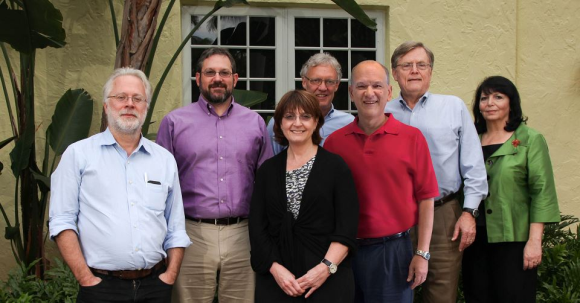2014 Research Report
Your support in 2014 made a meaningful difference. We are pleased to provide this summary of significant research progress over the past year.
The Depression Task Force
Left to right:
Rene Hen, PhD at Columbia Unversity
Joshua Gordon, MD, PhD at Columbia University
Helen Mayberg, MD at Emory University
Michael J. Meaney, PhD at McGill University
Eric Nestler, MD, PhD at Mount Sinai
Bruce S. McEwen, PhD at Rockefeller University
Huda Akil, PhD at University of Michigan
The Depression Task Force is an outstanding collaboration of leading neuroscientists – each a pioneer in their own field – including genetics, epigenetics, molecular biology, electrophysiology and brain imaging. This team has created an unprecedented Research Plan to find the root causes of depression and biomarkers for new treatments.
Their research broke new ground in 2014, opening up pathways to find new and better anti-depressants in the year ahead. The fact that they are collaborating and sharing information via the HDRF Data Center is a key reason they are achieving results with their HDRF-funded research grants.
2014 Research Highlights Include:
- Discovery of a single protein in a key brain region that regulates our ability to be resilient to depression. (Read the full article)
- Discovery that new neurons (“rookie” neurons) generated in the hippocampus may be the key to understanding post-traumatic stress disorder. (Read the full article)
- Discovery that chronic stress leads to abnormally low levels of the receptor that regulates glutamate (a key neurotransmitter), which in turn may lead to depression. (Read the full article)
- Further advances in our understanding of the specific genes that make us resilient to depression.
- Further understanding of how early childhood trauma can damage the normal function of the brain and increase chances of major clinical depression (MDD).
- Use of the revolutionary tool of optogenetics to view circuits in the living brain, and decipher the circuits that are disrupted in depression.
- Further advances in the use of Deep Brain Stimulation to treat severe, resistant depression.
Combined, in 2014 the seven neuroscientists of the Depression Task Force published their findings in over a dozen articles in major publications such as Scientific American, Nature, Science, Biological Psychiatry and Molecular Psychiatry.
At a time when federal funds are shrinking and major drug companies are withdrawing from brain research, HDRF answers an urgent need for leadership in the field.
The brilliant findings of the Depression Task Force point to a new direction in the way we view, diagnose, and treat depression and related mood disorders such as bipolar disorder, anxiety, and postpartum depression.
We look forward to sharing critical new developments in the year ahead. Together we can make breakthrough research possible in the last frontier of medicine – the mind and brain.
Thank you again for your meaningful support in 2014.

